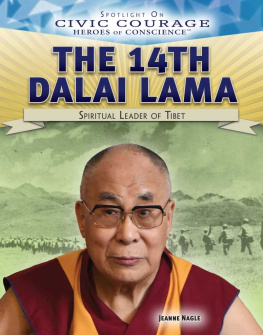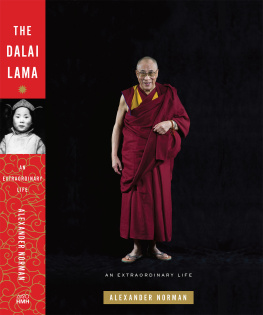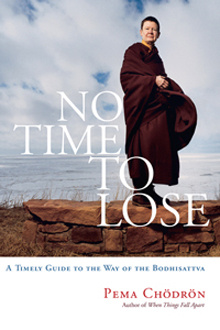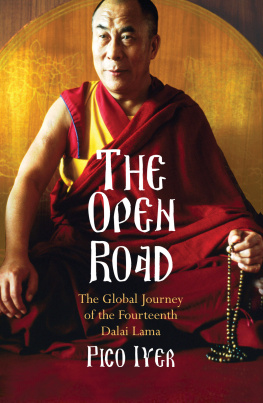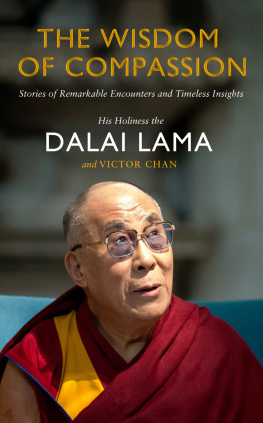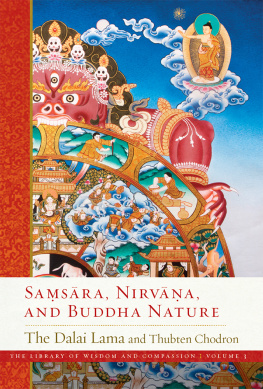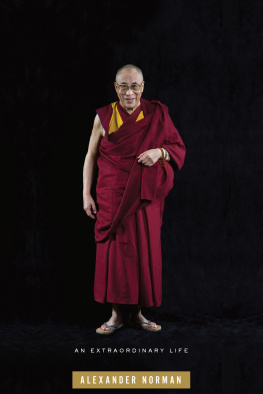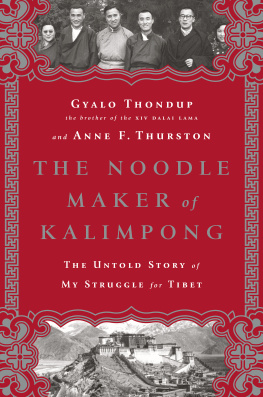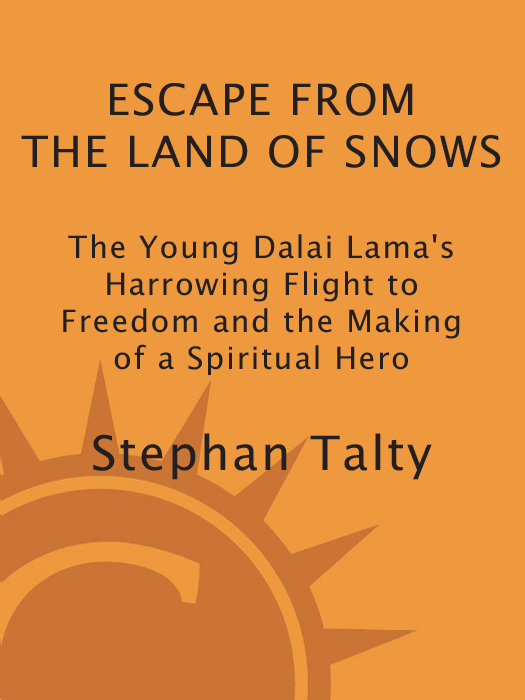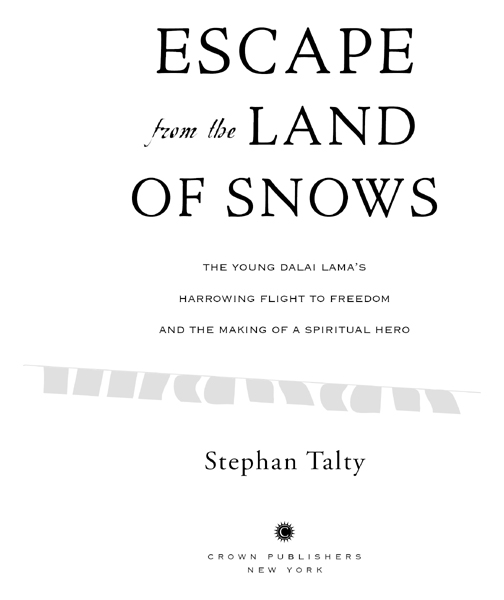ALSO BY STEPHAN TALTY
The Illustrious Dead
The Terrifying Story of How Typhus Killed Napoleons Greatest Army
Empire of Blue Water
Captain Morgans Great Pirate Army, the Epic Battle for the Americas, and the Catastrophe That Ended the Outlaws Bloody Reign
Mulatto America
At the Crossroads of Black and White Culture: A Social History
Copyright 2011 by Stephan Talty
All rights reserved.
Published in the United States by Crown Publishers, an imprint of the Crown Publishing Group, a division of Random House, Inc., New York. www.crownpublishing.com
CROWN and the Crown colophon are registered trademarks of Random House, Inc.
Library of Congress Cataloging-in-Publication Data
Talty, Stephan.
Escape from the land of snows: the young Dalai Lamas harrowing flight to freedom and the making of a spiritual hero / Stephan Talty.1st ed.
1. Bstan-dzin-rgya-mtsho, Dalai Lama XIV, 1935 Childhood and youth. 2. EscapesChinaTibet. I. Title.
BQ7935.B777T36 2010
294.3923092dc22 2010019827
[B]
eISBN: 978-0-307-46097-4
Maps by Jeffrey L. Ward
v3.1
For Karen and Suraiya
At the bottom of patience is Heaven.
Tibetan proverb
CONTENTS
One
A N E XAMINATION OF P RIOR M EMORIES
Two
T O L HASA
Three
A CROSS THE G HOST R IVER
Four
E ASTERN F IRES
Five
A R UMOR
Six
F OREIGN B ROTHERS
Seven
A CROSS THE K YICHU
Eight
F LIGHT
Nine
T HE N ORBULINGKA
Ten
O PIM
Eleven
G ODLESS R EDS VS . A L IVING G OD
Twelve
T HE J OKHANG
Thirteen
L HUNTSE D ZONG
Fourteen
I N T IBETAN P RISONS
Fifteen
T HE L AST B ORDER
Sixteen
M EETING A P OET
Epilogue
B ONFIRES
KEY PERSONS
Here is a list of the people who are featured in the following pages. A handful of Tibetan words and phrases are also used in the book. If at any time youre unclear about these terms, please consult the glossary on .
Athar: Athar Norbu (also known as Lithang Athar), a Khampa guerrilla trained by the CIA and reinserted into Tibet as a conduit to the resistance.
Noel Barber: The foreign correspondent for Londons Daily Mail in 1959.
Barshi: Barshi Ngawang Tenkyong, a junior official at the Norbulingka who on March 9, 1959, spread rumors of threats to the Dalai Lama.
Choegyal: Tendzin Choegyal, the Dalai Lamas younger brother, recognized as the high lama Ngari Rimpoche.
Choekyong Tsering: The Dalai Lamas father.
Diki Tsering: The Dalai Lamas mother.
Gadong: The second-most important oracle in Tibet, after the Nechung.
John Greaney: The deputy head of the CIAs Tibetan Task Force in 1959.
Gyalo: Gyalo Thondup, the Dalai Lamas second-oldest brother, who escaped from Tibet in 1952 and later acted as a conduit to the American government.
Heinrich Harrer: Austrian SS member and soldier in the German army during World War II who escaped a British colonial prison camp in India and fled to Tibet. Author of Seven Years in Tibet.
Ken Knaus: A member of the CIAs Tibetan Task Force. Later, author of Orphans of the Cold War: America and the Tibetan Struggle for Survival.
Ketsing Rimpoche: Abbott and leader of the Amdo search party for the Fourteenth Dalai Lama.
Lhamo Thondup: The first given name of the Fourteenth Dalai Lama.
Lhotse: A Khampa guerrilla trained by the CIA. Athars partner in their surveillance and reporting on the resistance.
Lobsang Samden: One of the Dalai Lamas older brothers.
Mao Zedong: The chairman of the Chinese Communist Party and leader of the Peoples Republic of China, 194976.
Narkyid: Ngawang Thondup Narkyid, monk official on the Council of Lhasa. Later, the Tibetan language biographer of the Thirteenth Dalai Lama.
Nechung: The state oracle of Tibet.
Ngab: Ngawang Jigme, a progressive kaln who served as Tibets governor-general during the Chinese invasion of 1950 and later served within the post-1959 government.
Norbu: Thubten Jigme Norbu, the Dalai Lamas eldest brother.
George Patterson: Scottish doctor, religious seeker, and Tibetan activist who worked as a correspondent for Londons Daily Telegraph.
Panchen Lama: The second-highest-ranking lama, or religious authority, in Tibet, after the Dalai Lama. In 1959, the Panchen Lama was the former Lobsang Trinley (193889).
Phala: The Dalai Lamas Lord Chamberlain, who controlled all access to His Holiness.
Reting Rimpoche: The Dalai Lamas first regent, 193341. He died in prison under mysterious circumstances after unsuccessfully attempting to regain power in 194445.
Shan Chao: A Chinese diarist in Lhasa in 1959 who kept a record of the uprising.
Soepa: Tenpa Soepa, a junior official at the Norbulingka in 1959.
Yonten: Lobsang Yonten, scion of a prominent nationalist family and a protester during the 1959 rebellion. Later, a member of the security staff of the Tibetan government-in-exile.
Zhou Enlai: The first premier of the Peoples Republic of China, serving from 1949 to 1976.
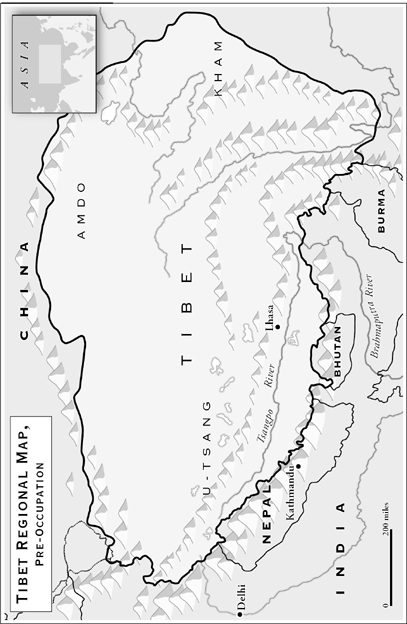
INTRODUCTION
Early one morning in March 1959, His Holiness the Fourteenth Dalai Lama walked slowly along a gravel path that led away from his small home at the Norbulingka, his beloved summer palace. The air just after first light still carried a snap of cold that reached from the Himalayas, and the sun was only now beginning to warm the breeze. This was his favorite time to walk the grounds, after rising for prayers and breakfast at 5:00 a.m., when everything was still. Against a sky beginning to lighten, the leaves of the palace treespoplar and willow, mostlyfairly pulsed green. It was the Dalai Lamas lucky color.
He was deep in thought, and then deep in the effort to avoid thinking. When he lifted his head he could spot thrushes and willow warblers and even an English kingfisher as they swung through the branches and then out over the two thick walls that surrounded the palaces 160 acres. The Norbulingka, three miles outside the capital city, Lhasa, was the place the Dalai Lama felt most at home.
As the Dalai Lama walked, he could hear the calls of his pet monkey, which was tethered to a stick in another part of the Jewel Park. If he was lucky, he would spot the musk deer that roamed the grounds, along with cranes, a Mongolian camel, and high-stepping peacocks. He could also hear the occasional burst of gunfire that echoed outside the walls. Out there, thousands of his fellow Tibetans were camped, guarding against what they thought were conspiracies to kill or abduct him. There were, the Dalai Lama was convinced, no conspiracies, but that didnt change the power or the direction of the uprising that was gathering in the streets of Lhasa. The crowds would not let him leave, and their very presence was inciting the Chinese, who had occupied the country, or retaken it from a corrupt, intriguing elite, if you asked them, nine years earlier.


